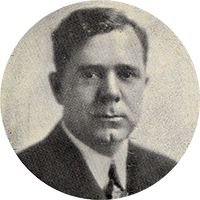Into that dangerous climate of hatred marched Huey Long, a friend of the poor, regardless of color. African Americans loved Huey because his programs for the poor helped them immensely. Before Huey Long, politicians neither cared about blacks, nor dared to help them for fear of retribution from the Klan.

A poor African American boy in Depression-era Louisiana. ~ Courtesy of LSU Libraries Special Collections.
To the outrage of the Klan and its sympathizers, Huey Long’s programs to uplift the poor meant that African Americans received public education, healthcare, tax exemptions, and the opportunity to vote free of charge (although the vast majority were still blocked from voting by local "Jim Crow" laws), among other benefits aimed at freeing the disenfranchised from the shackles of poverty. Black ministers even organized Share Our Wealth clubs among their congregations with Long’s blessing, a radical inclusion in 1930s America.
A man without personal racial prejudice, Huey Long had a different kind of problem with racism. Discrimination toward blacks was widespread among the voters, and sometimes a central issue in his opponents' campaigns. The powerful Ku Klux Klan always opposed Huey and tried to pressure others to vote against him. Especially damaging were opponents' newspaper cartoons of Huey with his arms around black folks, promising them schools and economic benefits.
In 1934, the Klan’s “imperial klonvocation” in Atlanta denounced Huey Long for having “an un-American attitude” toward “authority.” When the organization’s leader vowed to campaign against Long, Huey responded from the Senate press gallery, “Quote me as saying that that Imperial bastard will never set foot in Louisiana,” and suggested that the man risked receiving a taste of the Klan’s own treatment by leaving the state with “his toes turned up.”
Treat them just the same as anybody else, give them an opportunity to make a living, and to get an education.
Huey Long on his Negro policy as President (Williams p.704)





